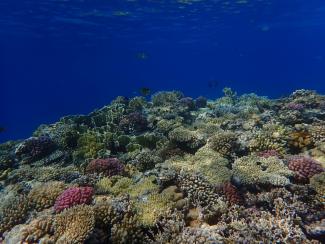Coral bleaching
Endangered ocean treasures

For 450 million years, corals have been building reefs. They always re-emerged after the great extinctions that marked earth’s history, giving scope to complex ecosystems and even “exporting” species to neighbouring habitats. To maintain their spectacular biodiversity, contemporary warm water reefs need water that is extremely nutrient poor, but gets very much sunlight.
The ecosystem services they deliver to human communities are of incalculable value. Absorbing up to 95 % of the force of waves, they protect coastlines. They cover only 0.15 % of ocean floors, but are the habitat of about one quarter of marine biodiversity, so they ensure the food security of hundreds of millions of people. Moreover, reefs attract tourists, generate carbonate and are the source of pharmaceutically relevant agents. For example, an AIDS medication is derived from a Caribbean sponge, and the poison of a cone shell is the basis of a highly effective painkiller. In total, reef related annual revenues are estimated to amount to € 26 billion.
All over the world, reefs are under imminent threat today. More than one third has already been lost since the 1980s. Another 50 % is considered to be damaged long-term. Up to the early 21st century, overfishing, pollution, mismanagement and destructive fishing methods were believed to be the main reasons, and climate change was considered a less important driver. In the meantime that perception has changed: global coral bleaching was first observed in 1998, and the phenomenon reoccurred in 2010 and 2015, with increasing durations. The reason is the global increase in ocean temperatures.
Australian experts warned as early as 2015, at the UN climate summit in Paris, that global warming must be kept significantly below two degrees on average. Otherwise, the Great Barrier Reef (GBR) would be reduced to only 10 % of its 1980 size by 2035. The GBR is the world’s largest coral reef. The scholars estimated that 30 % would survive if global warming was limited to 1.5 degrees. In 2016 and 2017, bleaching once more affected the GBR along a stretch of 1,500 kilometres. In some places, more than half of the corals died, and in the north, some important reef building species disappeared entirely. The ecosystem has thus changed irreversibly.
Lack of progress in mitigating climate change is not the only problem. Many coral reefs are in the territorial waters of developing countries and emerging markets. Some of them suffer political instability, lack of funds for local action or do not muster the political will. Climate protection is indispensable for saving the reefs, but it will not suffice. Additional measures are needed to minimise the environmental pressure exerted by fishing, pollution, tourism and human-caused impacts in general. Protected areas must be established. Fishing must be controlled effectively in protected as well as unprotected reef waters. Tourism must become sustainable. Moreover, land-use patterns and coastal management must change as well. It is necessary to prevent sedimentation from rivers, erosion and construction sites. The same is true of pollution with nutrients from untreated wastewater or agriculture, chemical substances in general and garbage, especially of the plastic variety.
To protect reefs effectively, we need a holistic approach, taking into account everything that has a bearing on these precious ecosystems. The challenge is huge, and as a contribution to rising to it, the International Coral Reef Initiative (ICRI) declared 2018 to be an International Year of the Reef. Previously, 1997 and 2008 had been declared as such. Reef protection requires constant monitoring of reef conditions, research on how they adapt to change as well as awareness raising and education. For the purpose of monitoring, the Reef Check method was established 20 years ago. It serves to identify and compare human impacts on essential reef species globally.
Jenny Krutschinna is a marine biologist and has been an activist of Reef Check, an internationally active non-governmental organisation, since 2001.
jenny.krutschinna@reefcheck.de
Links
International Coral Reef Initiative:
https://www.icriforum.org/
International Year of the Reef:
https://www.iyor2018.org/
Reef Check:
www.reefcheck.org












